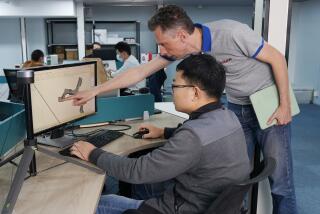Firm Gives Advice to Companies Lured Abroad
- Share via
PALO ALTO — Tax breaks and cheap labor have lured American companies overseas, but a real estate consultant says his Silicon Valley clients worry more about stability, location and quality of life when they go abroad.
Fewer companies are basing decisions about moving only on economic considerations, says Robert J. Pope, who has advised such companies as National Semiconductor, Amdahl, Wyse Technology, Raychem and Rolm.
“Cost of land ranks very low on the list of criteria,” he said in an interview. “What they’re looking for is quality of life. Is it going to be the kind of place where they can get management people to go?
“Companies also are looking for a stable government and labor force,” he said. “They are less afraid of training a labor force than they are of losing it and having to train and retrain. And they’re concerned about strikes and how heavily unionized the areas are, particularly electronics companies that have pretty well managed to avoid unions.”
Pope, 46, suggests companies examine such quality-of-life factors as housing and schools and to consider whether the country wants them enough to cut red tape to help them.
For manufacturing and distributing companies, Pope advises taking a close look at shipping and ground transportation. And for all companies, a paramount concern is whether they can get their money out if they have to close.
“For some surprising reason, most companies don’t think about what their real estate facilities needs are and incorporate them into their business plan,” he said.
“Most can tell you what their profits are expected to be over the next five years, or how many people they’re going to need. I haven’t had one yet that can tell me how many square feet they’re going to need and the types and locations of those facilities.”
When National Semiconductor wanted to sell a facility in Dublin, the company ran into problems with the Irish government, he said, explaining that the Irish Development Authority had campaigned hard to attract American industry and wasn’t pleased to see a company close up shop.
In this case, National Semiconductor had acquired a bankrupt cash-register company, Data Terminal Systems, with facilities in Puerto Rico and Ireland. After three years of negotiating with the IDA to get out of the Dublin site, National Semiconductor turned to Pope.
“I pointed out to the Irish government that, if they wanted to stimulate industry, the way to do that was not to get the reputation that Ireland was a real easy place to get into but not so easy to get out of if you had to close a facility or you fell on hard times,” Pope said.
He also said that National Semiconductor is the second-largest user of space in the Silicon Valley after Hewlett-Packard and that it should not be held responsible for Data Terminal Systems’ failure. Finally, the IDA agreed and approved selling the building.
That type of problem is one of dozens that American companies face when they decide to open a facility overseas.
“Companies worry primarily about government participation in the business,” Pope said. “We run into problems here with cities.
“You have it in spades when you’re dealing with a foreign government that wants to get involved in the company by putting tax benefits in,” he said. “In some cases, they’ll build the facility and train people to solve huge unemployment problems. If they’re going to get into the management of the company, it’s like oil and water. American companies with entrepreneurial spirit would rather say, ‘Forget it.’ ”
Scotland and Ireland are the two most aggressive European countries in luring American industry, followed by parts of Switzerland and some Scandinavian countries.
Belgium, which ran into problems when it tried to get American business, has hired Pope as a consultant on a long-range plan starting in January.
“There were some very sharp people in the Belgium government that were brought in from business and they were saying, ‘What can we do? We’re not reaching the marketplace,’ ” Pope said. “We spent about three hours talking about some basic ways they were missing the boat. From that, they asked us if we would consult with them.”
Pope, who has a small firm, said he was a little hesitant about jumping from advising companies to a government.
“But it’s the kind of opportunity where we’d always wonder why did we pass it up,” he said. “It could be we’ll work with Belgium and never any other countries, or it could be a whole new market for us. It would be very interesting to take that and then go to work for an undeveloped country on the Pacific Rim, for example, and help them establish themselves.”
More to Read
Inside the business of entertainment
The Wide Shot brings you news, analysis and insights on everything from streaming wars to production — and what it all means for the future.
You may occasionally receive promotional content from the Los Angeles Times.










